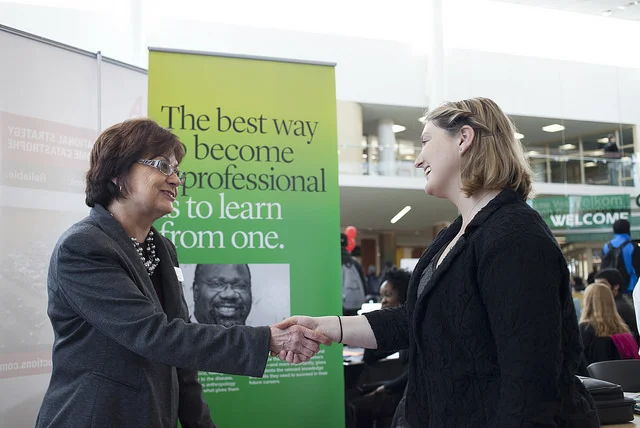Experience versus Qualifications - Solutions to the Catch 22
Source: opensource.com
What happens when you come out of college or a training course and you can’t find a job? You hear things like “Sorry, we’re looking for someone with more experience” or “Sorry, you don’t have the qualifications that we’re looking for”. I think that most young people have heard this at some stage before. I’ve been in that position myself and it’s definitely not something that you want to hear after you’ve spent 4 years or more completing a third level qualification.
Of course, this may not apply to certain jobs such as doctor, dentist, pilot etc, because usually those types of jobs have so much training as part of the courses, that the students actually already have experience and a qualification by the time they finish their course and start working. Therefore, it’s not necessary to deal with those here. But for other jobs like sales, marketing, administration, design, hospitality, programming, media etc, the rules are more flexible.
If you’re anything like me, after you finished your degree, or masters, you thought that you were ready to get the job of your dreams, the job you deserve, only to find out that you were at the very bottom of the ladder, again.
You realise that you’re in an almost impossible position - you’ve no experience so you can’t get a job and you’ve no job so you can’t get experience.
If you have found yourself in this position before or if you find yourself in this position now, here are a few tips that I hope will help you find a job:
1. Use the contacts of everyone you know!
Source: hobvias sudoneighm
Regardless of many other factors, knowing someone who already works in the company or who has strong connections always seems to be the best way of getting employed. So if you can get in touch with people who work for companies that you’re interested in, get in touch with them! Use LinkedIn, Twitter, Facebook or whatever else you need. If you don’t know anyone who works for a company, don’t rule out the possibility of trying to meet someone who works for the company. Sports clubs, company employment events or other social avenues can often be useful ways of meeting the right people. Offer to buy them a coffee or a drink, so at least they get something from you too.
2. Give first. Do an internship or trial placement.
Source: COD Newsroom
An internship is a great idea for getting some experience and learning more about the workings of the company and for making contacts. So make the most of those opportunities while you’re there. If you’re going to work for a company that isn’t paying you, there’s no harm in asking them what the realistic possibilities of full-time employment are. Also, it’s important to make the best impression possible while working with the company, even if you don’t like the company. Ireland is a small country and many of the industries and businesses are connected. In the end, if you don’t get a position with the company but made a good impression, they might give you an introduction or a reference for a partner company that is looking for new employees. These steps sound simple, but I’ve met a lot of people who don’t understand them.
3. Understand that businesses ultimately want to make money.
Source: TaxRebate.org.uk
This means that if you can help them do that or prove to them that you can make them money before they employ you, you'll make their decision a whole lot easier. Try to see it from their point of view. They need you to make them more money than they pay you, or for your work to allow someone else in the company to make more money for the business. So before they employ you, will your work be able to bring more money into the company? Better yet, how could you show them that you will bring in additional business to their company? Any business I have ever worked for has always welcomed potential new employees adding value before considering giving them a job. That’s not to say that you have to work for free at first, but if you can show what you can bring to the company, that will make a big difference to their decision. So don't be afraid to be proactive and show them what you can do!
4. Be persistent and find ways to solve problems.
I’ve worked with many businesses in different capacities in only a few years, and what I’ve found is that they all want to have less problems and to make more money. It’s that simple. The thing is that part of being in business is that you’re constantly encountering problems and then trying to solve them. But you can’t just solve them, you need to do it in a cost effective, efficient way that is in line with the interests of the business and its customers. So be confident in the studies that you have already done and the work that you will do for them in the future. Make sure that you convey the idea of being able to solve problems or figure out how to solve problems as they arise. This is important as ultimately, they want you to take work away from them, not make more work and problems for them to deal with.
5. Embrace the opportunities of social media.
At this stage of the game, most businesses understand that they need to have social media accounts and they know that there is a lot of work involved in maintaining them. In fact, it’s often a complete job for one member of their team, if not more. However, depending on the time constraints, resources and the skills of the current employees, they may or may not be able to cope with the additional demands that social media brings. This could provide you with an opportunity to solve this problem for them with skills that you already have or that you could develop. Once you prove that the work you do on social media has a real value, it may be an easier decision for the company to take you on as an employee.
Source: Alan Reeves
6. Continue to learn and to develop new skills.
Source: Tulane Public Relations
Always, always, always continue to study and continue to learn. This the key to staying at the top of your game. It also shows that you have a real interest in your area of work and will show companies that you are very enthusiastic and hard working. I’ve heard professionals at the top of their game investing as much as 10% of their annual income in CPD (Continuous Professional Development) and a similar amount of time. That is a massive investment but it makes it clearer as to why they are at the top.
7. Start working already.
Anytime I’ve been offered a job or more work is when I have already been doing the work. Few people will ask you to do work for them if they hear you talking about working, but if they see that you’re already doing it in some capacity, they are much more likely to ask you to work for them. I have experienced this from the business' side and from an employee's side. It really works. For example, a girl spoke to me about how she’d love to be a writer. I asked her how much she writes. She said ‘nothing’. There’s nothing to stop her from doing what she loves, but who’s going to employ her before they see some writing from her? We all know that there are many people who are already making money from writing blogs. So the opportunities are there if we are willing to look for them.
At a previous company that I worked for, we had a intern who wanted to come in everyday and would do everything and anything to work with us. When there was no more work for him, he was in the office studying. Eventually, we started to ask him to do more and more projects, and now he has a full time job there. He was the most experienced intern because he asked to be there all the time and then he also had a profound knowledge because he was always studying even if there was nothing for him to do. So, it wasn't a difficult decision to take him on full-time.
So perhaps there are other ways to get hired without having 3+ years of experience.
Is there hope for people with experience but no qualifications?
Source: Joi Ito
Of course. Richard Branson never went to college, Bill Gates, Steve Jobs and Mark Zuckerberg all dropped out. Also, here are some Irish people who have succeeded without degrees. Now, I’m not saying that you should not get a qualification, or you shouldn’t get a good education. I think education is essential, whether it be formal or informal. But what I’m saying is, don’t let something limit you just because you think it’s a limit. If someone else has done it before, there’s the possibility that it can be done again, just look at the examples I've already given in this paragraph.
When the qualifications are not necessarily a measure of ability and competence, I would argue that they are less important than real competence on the job. For example, people who work for creative companies (art, design, media production etc.), understand that on-the-job ability is the most important thing.
I hope this post has helped and thanks for reading.
Ronan












